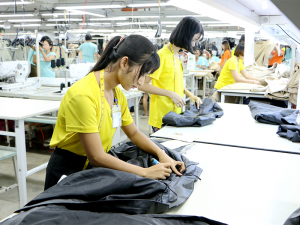The clothing manufacturing industry is undergoing a transformative shift as cutting-edge technologies and emerging trends redefine the future of production lines. To meet the growing demand for faster, more sustainable, and customized fashion, manufacturers are embracing innovations that enhance efficiency, reduce costs, and improve garment quality.
Automation and Artificial Intelligence: Revolutionizing Production Lines
Automation and artificial intelligence (AI) are at the forefront of this revolution. Modern production lines are increasingly adopting automated systems capable of performing complex tasks—such as cutting, sewing, and quality control—with remarkable speed and precision. AI-driven algorithms also enable predictive maintenance, ensuring machines operate at optimal levels while minimizing downtime. This technological advancement not only reduces production costs but also significantly improves the consistency and quality of the final product.
Sustainability: The Future of Ethical Fashion
Sustainability is a key trend shaping the future of clothing production. As consumers prioritize eco-friendly products, manufacturers are adopting sustainable practices across their production lines. Energy-efficient technologies, waste reduction strategies, and the use of recycled materials are becoming industry standards. Innovations like waterless dyeing and closed-loop recycling systems are reducing environmental impact, aligning with the global push for more responsible fashion. Embracing sustainability is not just a trend—it’s essential for the long-term success of the industry.
Smart Textiles and 3D Printing: Pioneering Customization
The rise of smart textiles and 3D printing is set to revolutionize how clothing is produced. Smart textiles, which can adapt to environmental conditions or monitor health data, open new possibilities for functional and personalized clothing. 3D printing technology allows manufacturers to create intricate garment designs with minimal material waste, supporting on-demand production and reducing the need for large inventories. These innovations are paving the way for a new era of personalized fashion, tailored to the unique preferences of individual consumers.
Digital Textile Printing:
Speed and Flexibility:
Digital textile printing is much faster than traditional methods. It also allows manufacturers to switch designs quickly and easily, making it easy and efficient to produce small batches or one-off products. Because digital printing is more precise, it can produce vibrant patterns with rich detail, making it ideal for custom designs that require high-quality printing.
Reduced Use of Water and Dye:
Traditional fabric dyeing methods are often water-intensive, not only consuming a lot of water but also causing waste issues. Digital textile printing uses significantly less water and dye, making it a more sustainable option for environmentally conscious manufacturers.
Conclusion: Embracing the Future of Clothing Production
The future of clothing production lines is bright, driven by automation, artificial intelligence, sustainability, smart textiles, and 3D printing. These innovations are reshaping how garments are made, offering new opportunities for efficiency, customization, and eco-friendly practices. SYS GROUP is seizing these trends by focusing on building and innovating our manufacturing bases. We have established efficient and specialized clothing factories for every product category, with over 200 production lines across Southeast Asia, enabling us to grow with our customers. We are deeply rooted in exploring equipment and combining technology with practical production processes to develop specialized equipment and tools suitable for our clothing production. SYS GROUP is committed not only to meeting customer needs but also to setting the standard for the clothing industry in the years to come.




